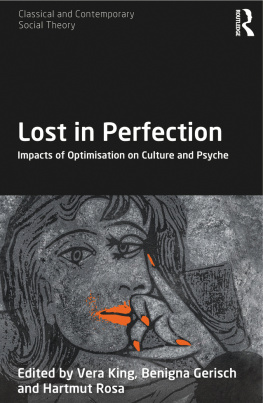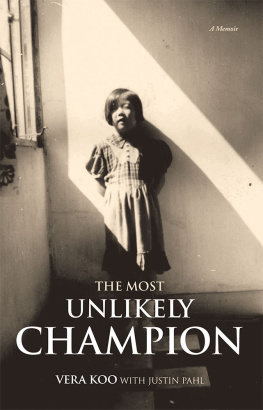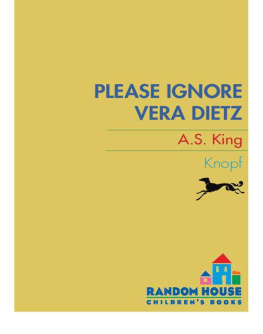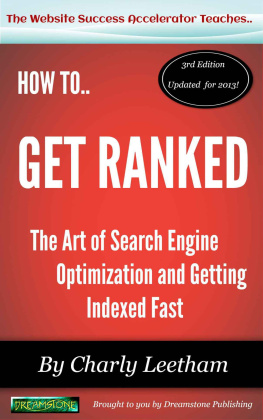Lost in Perfection
The permanent struggle for optimisation can be seen as one of the most significant cultural principles of contemporary Western societies: the demand for improved performance and efficiency as well as the pursuit of self-improvement are considered necessary in order to keep pace with an accelerated, competitive modernity. This affects not only work and education, but also family life, parentchild relationships and intimate relationships in respect to the body and the self, in regard to the public as well as the private realm. Bringing together contributions from renowned scholars in the fields of sociology, psychology and psychoanalysis, this book explores the impacts of optimisation on culture and psyche, examining the contradictions and limitations of optimisation, in conjunction with the effects of social transformations on individuals and shifts in regard to the meaning of pathology and normality.
Vera King is Professor of Sociology and Social Psychology at Goethe University and Managing Director of the Sigmund Freud Institute, Frankfurt a.M., Germany.
Benigna Gerisch is Professor of Clinical Psychology, Psychoanalysis, Intervention and Psychodynamic Counselling at International Psychoanalytic University, Berlin, Germany. She is a trained psychoanalyst and member of the International Psychoanalytic Association (IPA).
Hartmut Rosa is Professor of Sociology at Jena University and Director of the Max Weber Center, Germany. He is the author of Social Acceleration: A New Theory of Modernity .
Classical and Contemporary Social Theory
Classical and Contemporary Social Theory publishes rigorous scholarly work that re-discovers the relevance of social theory for contemporary times, demonstrating the enduring importance of theory for modern social issues. The series covers social theory in a broad sense, inviting contributions on both classical and modern theory, thus encompassing sociology, without being confined to a single discipline. As such, work from across the social sciences is welcome, provided that volumes address the social context of particular issues, subjects, or figures and offer new understandings of social reality and the contribution of a theorist or school to our understanding of it.
The series considers significant new appraisals of established thinkers or schools, comparative works or contributions that discuss a particular social issue or phenomenon in relation to the work of specific theorists or theoretical approaches. Contributions are welcome that assess broad strands of thought within certain schools or across the work of a number of thinkers, but always with an eye toward contributing to contemporary understandings of social issues and contexts.
Series Editor
Stjepan G. Mestrovic, Texas A&M University, USA
Titles in this series
Critical Theory and the Classical World
Martyn Hudson
Emotions, Everyday Life and Sociology
Edited by Michael Hviid Jacobsen
Urban Walls
Political and Cultural Meanings of Vertical Structures and Surfaces
Edited by Andrea Mubi Brighenti and Mattias Krrholm
For more information about this series, please visit: https://www.routledge.com/sociology/series/ASHSER1383
Lost in Perfection
Impacts of Optimisation on Culture and Psyche
Edited by Vera King, Benigna Gerisch and Hartmut Rosa
With editorial assistance from Julia Schreiber and Benedikt Salfeld
First published 2019
by Routledge
2 Park Square, Milton Park, Abingdon, Oxon OX14 4RN
and by Routledge
711 Third Avenue, New York, NY 10017
Routledge is an imprint of the Taylor & Francis Group, an informa business
2019 selection and editorial matter, Vera King, Benigna Gerisch, Hartmut Rosa; individual chapters, the contributors
The right of Vera King, Benigna Gerisch, Hartmut Rosa to be identified as the authors of the editorial material, and of the authors for their individual chapters, has been asserted in accordance with sections 77 and 78 of the Copyright, Designs and Patents Act 1988.
All rights reserved. No part of this book may be reprinted or reproduced or utilised in any form or by any electronic, mechanical, or other means, now known or hereafter invented, including photocopying and recording, or in any information storage or retrieval system, without permission in writing from the publishers.
Trademark notice : Product or corporate names may be trademarks or registered trademarks, and are used only for identification and explanation without intent to infringe.
British Library Cataloguing-in-Publication Data
A catalogue record for this book is available from the British Library
Library of Congress Cataloging-in-Publication Data
Names: King, Vera, editor. | Gerisch, Benigna, editor. | Rosa, Hartmut,
1965- editor.
Title: Lost in perfection: impacts of optimisation on culture and psyche /
edited by Vera King, Benigna Gerisch and Hartmut Rosa; with editorial
assistance from Julia Schreiber & Benedikt Salfeld.
Description: Abingdon, Oxon; New York, NY: Routledge,
Series: Classical and contemporary social theory | Includes bibliographical
references and index.
Identifiers: LCCN 2018003035| ISBN 9781138894365 (hbk) |
ISBN 9781315179964 (ebk)
Subjects: LCSH: Social sciencesPhilosophy. | Mathematical
optimizationSocial aspects.
Classification: LCC H61.15 .L67 2018 | DDC 300.1/1dc23
LC record available at https://lccn.loc.gov/2018003035
ISBN: 978-1-138-89436-5 (hbk)
ISBN: 978-1-315-17996-4 (ebk)
Typeset in Times New Roman by Keystroke, Neville Lodge, Tettenhall, Wolverhampton
Contents
Guide
Christiane Beerbom , Psychologist, is working as a Psychotherapist in Berlin.
Ada Borkenhagen is Psychoanalyst and Traininganalyst (IPA) and Assistant Professor at the University Hospital for Psychosomatic Medicine and Psychotherapy at the University of Magdeburg.
Ulrich Brckling is Professor of Cultural Sociology at the University of Freiburg.
Heinz Bude is Professor for Macrosociology at the University of Kassel.
Katarina Busch , Educational Scientist, is Research Assistant at the Department of Educational Sciences at the University of Hamburg.
Eve Chiapello is Directrice dtudes (Professor) at the cole des Hautes en Sciences Sociales (EHESS) .
Sophie de Mijolla-Mellor is Psychoanalyst and Professor emeritus of Psychopathology and Psychoanalysis at the University of Paris-Diderot.
Alain Ehrenberg is Research Director emeritus at the Centre National de la Recherch Scientifique (CNRS).
Benigna Gerisch is Psychoanalyst (IPA) and Professor of Clinical Psychology, Psychoanalysis, Intervention and Psychodynamic Counselling at the International Psychoanalytic University Berlin (IPU).
Vera King is Professor of Sociology and Social Psychology at the Goethe University and Managing Director of the Sigmund-Freud-Institute (SFI) in Frankfurt/M.
Steffen Krger , PhD, is Postdoctoral Researcher at the Department of Media and Communication at the University of Oslo.
Diana Lindner , PhD, is Postdoctoral Researcher at the Department for Sociology at the Schiller-University of Jena.
Heinrich Merkt is working as a Psychologist at the Robert-Bosch-Krankenhaus in Stuttgart and in Psychoanalytic Training (IPA).
Jrg Oberthr , PhD, is Postdoctoral Researcher at the Department of Sociology at the University of Jena.












